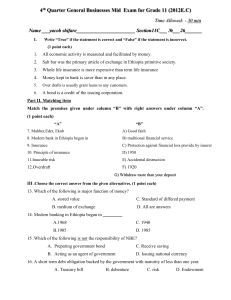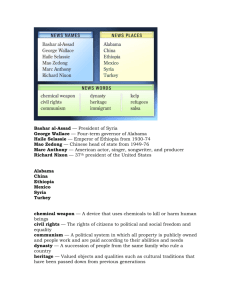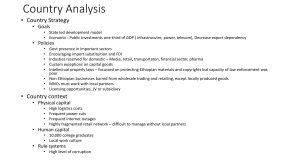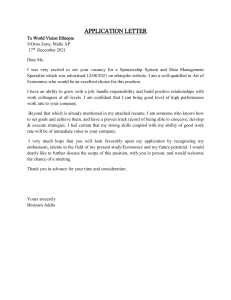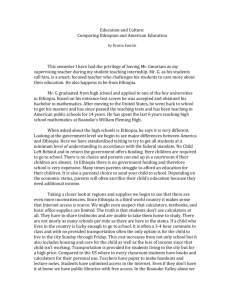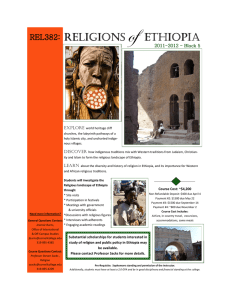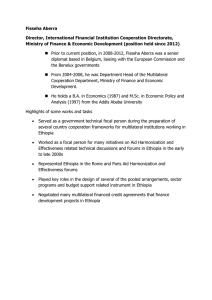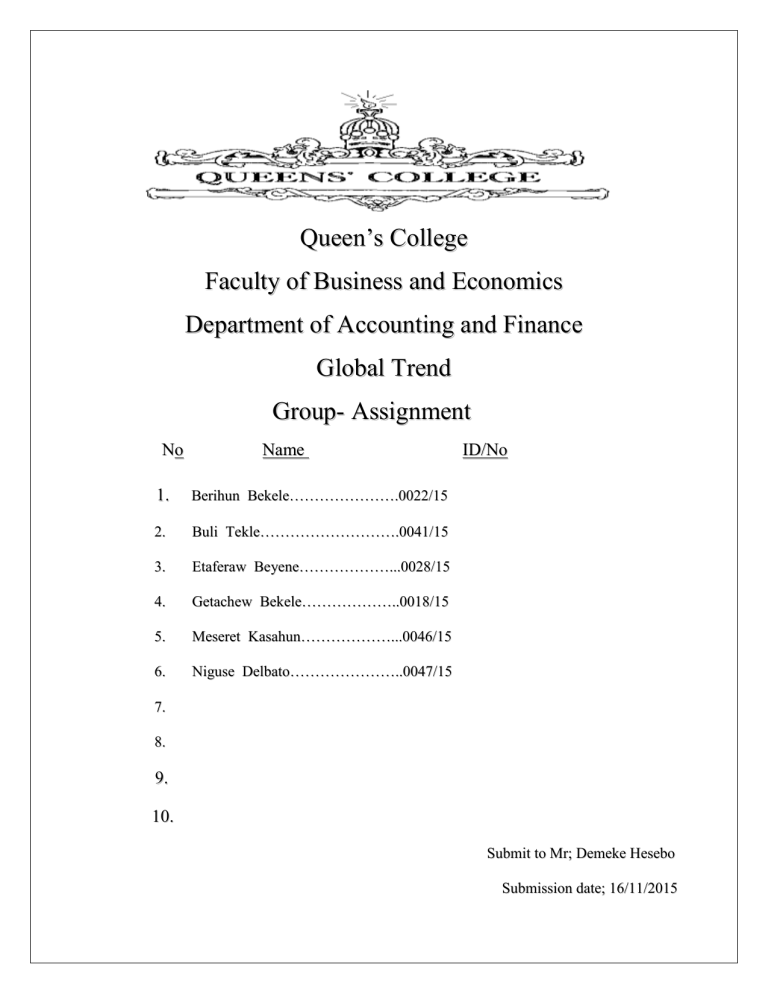
Queen’s College Faculty of Business and Economics Department of Accounting and Finance Global Trend Group- Assignment No Name 1. Berihun Bekele………………….0022/15 2. Buli Tekle……………………….0041/15 3. Etaferaw Beyene………………...0028/15 4. Getachew Bekele………………..0018/15 5. Meseret Kasahun………………...0046/15 6. Niguse Delbato…………………..0047/15 ID/No 7. 8. 9. 10. Submit to Mr; Demeke Hesebo Submission date; 16/11/2015 Contents 1. Overview of Foreign Policy of Ethiopia ..................................................................................... 1 1.1. Foreign Policy during Tewodros II (1855-1868) ................................................................. 1 1.2. Foreign Policy during Yohannes IV (1872-1889) ............................................................... 1 1.3 Foreign Policy during Menelik II (1889-93) ........................................................................ 2 1.4 Foreign Policy during Emperor Haile Selassie I (1916-1974).............................................. 3 1.5 Foreign Policy during the Military Government (1974—1991) ........................................... 5 1.6 Foreign Policy of Ethiopia in the Post 1991 ......................................................................... 7 2. Ethiopian foreign policy objectives ............................................................................................ 9 2.1. Objective of Ethiopian foreign policy during era of Tewodro II ……………………..…...9 2.2. Objective of Ethiopian foreign policy during era of Yohannes IV ...................................... 9 2.3. Objective of Ethiopian foreign policy during era of Menelik II………………………….10 3. Comparison among the last three foreign policies of the Ethiopia state…………………..…..11 4. References ................................................................................................................................. 14 i Global Affairs 2015 1. Overview of Foreign Policy of Ethiopia 1.1. Foreign Policy during Tewodros II (1855-1868) At the middle of 19th century when Ras Kassa emerged as one of the eminent kings defeating all minor kings fighting for the control of the throne, during the chaotic Era of Princes, the King was predominantly concerned with establishing control over the fragmented parts of the Empire. He wanted to create a united Ethiopia, but only partially succeeded. Yet he introduced the idea of modernity and modern army at the time. Throughout his reign Tewodros tried to develop a dynamic foreign policy that reached out beyond the Horn Region. He sought the Western Christian world to recognize his country and help him to modernize his country. Moreover, as Keller has put it ―he appealed specifically to Britain, France and Russia as Christian nations to assist him in whatever ways possible in his fight against the Turks, Egyptians and Islam‖. The emperor attempted to establish his diplomatic relations to fight his immediate enemies claiming Christianity as instrument of foreign policy. However, the emperor‘s passionate demand for modern technology and skilled man power from Britain was not concluded to his satisfaction as the latter sent religious missionaries. Despite his demand to be recognized as the emperor of Ethiopia and treated with respect and equal footing with the British Queen that was not reciprocated by Queen Victoria. Consequently Tewodros took desperate measures by taking hostage of several British missionaries including the consul which was responded with the British Millitary Expedition (Keller). Tewodros‘s Troops were easily defeated and the King did not surrender but tragically committed suicide. 1.2. Foreign Policy during Yohannes IV (1872-1889) Like his predecessor, Yohannes considered Islam as a threat to the territorial integrity of the polity. Indeed Egypt tried to put a serious security threat in its continued attempt to invade the country under many pretexts, yet its motive was to control the source of Blue Nile. These, however, were not successful as Egypt faced subsequent defeat both in 1875 and 1876 at the Battle of Gundet and Gura respectively (Keller). 1|Page Global Affairs 2015 In addition to Muslim threat, the emperor saw European expansionism as greater threat to the survival of the country. In fact his calculation of threat has turned out to be real as Italy got a foot hold at the port of Massawa in 1885.This colonial ambition of Italy was reflected by the Foreign Minister speech. However, the emperor died fighting with the ―Mahadists‖. The Sudanese resistance groups against British rule happened to invade Western Ethiopia because of their presumption that Yohannes IV was collaborating with the British. 1.3 Foreign Policy during Menelik II (1889-93) Following the death of Yohannes, Menlik II of Showa has assumed to the throne. Menelik was the King of Shoa region before his coronation as the Kings of Kings of Ethiopia. He had expanded his sphere of influence towards the far South and East incorporating new areas and communities peacefully or otherwise. Minelik was aware of the strategic importance of outlet to the sea for the country as he felt that the country‘s access to the sea in the North had fallen under Italy‘s influence since the mid1890s. Menilik comfortably exploited the opportunity to consolidate his power, perhaps to deter Yohannes and bolster its expansionist policy to the south. Menelik‘s relation with Italy had disappointed Yohannes as witnessed by the absence of Menelik from participation in the war against Mahadists. Following the death of Yohannes Italy continued to be the main challenge in the North. Moreover the King saw the other colonial powers surrounding all four corners of the country as the scramble of Africa was heightened. Italy expanded towards the hinterland of Ethiopia from its first hold of Bogess, later named Eritrea, and Missawa port crossing Tekeze river. The emperor followed double track diplomacy to contain or reverse Italy‘s expansion and maintain the territorial integrity of his country. On the one hand, he entered many treaties and agreements to solve the challenge amicably. On the other hand the emperor was preparing himself by accumulating military ammunitions to defend the aggression from any side of colonial powers, British, French and of course Italy. However, the emperor‘s diplomatic endeavor with Italy failed to result in peace due to Italy‘s misinterpretation of the controversial article 17 of the ‘Wuchalle’ treaty. The treaty did contain different meanings and interpretations in the respective languages of the parties. 2|Page Global Affairs 2015 According to the Italian version, Ethiopia failed under the protectorate of the former which then led to the abrogation of the ‗Wuchale‘ treaty by Ethiopia in 1893. In 1896, the emperor declared nation-wide war against Italy in defense of the territorial integrity and sovereignty of the century old nation. After a severe battle, at the bloody Battle of Adwa Menelik and his people managed to defeat the colonial power. The significance of the Adowa victory is loud and clear as many European powers recognized Ethiopia as an independent African state. Indeed Britain, France, Russia and the vanquished Italy came to Menelik‘s Palace to arrange formal exchange of Ambassadors. As the boundary issue was not settled, there have been disputes and counter claims with the neighboring countries especially with Sudan, Somalia and Eritrea. What so ever the case may be, Ethiopia‘s foreign policy of the forth coming rulers has significantly been informed by the notion of territorial integrity of the country. 1.4. Foreign Policy during Emperor Haile Selassie I (1916-1974) Emperor Haile Selassie I, was dedicated to the creation of a stronger, centralized and bureaucratic empire with unquestioned respect by the international community. This was clear as early as 1923, when as Regent to the Crown, Teferi Mekonen, facilitated Ethiopia‘s entry to the League of Nations. Ethiopia‘s membership in the League of Nations was clearly instigated by the ever present danger of invasion by Italians. When the Italian Fascists finally invade Ethiopia between 1936 and 1941, the Emperor fled to London and established a government in exile. From there he journeyed to Geneva, Switzerland, to make a plea before the League of Nations for aid in defense to the country the League ultimately failed to take any substantive measure against Italy and the plea of the King was ignored. But, the King continued to believe in the ultimate value of effective diplomacy. He also recognized Ethiopia‘s need for a powerful external patron until he could restore the independence of his country. His diplomatic skills and Britain‘s own strategic necessities in the area enabled him to elicit the aid of the British in securing the liberation of Ethiopia. In the immediate post-war period, Ethiopia was extremely dependent on British military, economic and technical aid. At the same time, the Emperor feared that Britain might either declare Ethiopia a protectorate or use the claim that the whole of Italian East Africa; Eritrea, Ethiopia and Somalia, as an occupied enemy territory. Haile Sellasie‘s fear moved him to seek 3|Page Global Affairs 2015 alternative relationships that would allow him to loosen Ethiopia‘s tie with Britain. When all the Allied powers were jockeying for leverage in the reordered international political system. Through diplomacy, Haile Selassie was able to regain complete administrative control over the territory he claimed and more by 1954. In 1952 a U.N. resolution had made possible a federation between Ethiopia and the former Italian colony of Eritrea. Eritrea was to have regional autonomy within the federation, but Haile Selassie was not content with only administrative control. He was not satisfied until he secured the endorsement of both the Eritrean and Ethiopian Assemblies in 1962, which allowed him to incorporate Eritrea fully in to the Empire, making it a province of Ethiopia instead of a trustee-ship. These maneuvers took place against the backdrop of the emperor‘s loosening ties with Britain and establishing new patronage links with United States. British Military Aid was withdrawn in 1952, and the King moved quickly to firm up relations with the United States. Since the early 1940s, the United States had coveted a base in Eritrea where it could set up a radio tracking station. Haile Selasie viewed the use of such an installation by the United States as having more benefits than costs. Two agreements were concluded in 1953 to formulize this new relationship. As a result, the United States guaranteed Ethiopia‘s security with which the emperor could approach the task of political consolidation. In addition to the military aid Ethiopia received from the United States over the next 23 years, its armed forces also benefited from the presence of a Military Assistance Advisory Group, which was established in 1954 and provided training for Ethiopian forces. Between 1953 and 1976, 3978 Ethiopian soldiers were trained in the United States. The military aid was decisive for the Emperor to ensure his survival at home and maintain the territorial integrity of the country. The United States contributed to the expansion of Ethiopian military as a hedge a against the Somalia threats. It also provided counterinsurgency training and on the ground advisors to help to suppress Eritrean Nationalism. Ethiopia also played significant role in Africa in fighting for African independence and to end colonialism and apartheid. In this manner, the emperor can be considered as one of the founding fathers of African Unification. The establishment of the organization of African Unity in the capital of Ethiopia witnessed the prominent role of the emperor in African affairs as well. There was a time when the emperor resolved the perennial conflict in Sudan through His Good Offices. Ethiopia also played a significant role in maintaining international peace 4|Page Global Affairs 2015 and security by commit ting its troops for peacekeeping operations in Korea in 1951 and the Congo in 1961. Of course the emperor‘s strategic alliance with outside powers helped him to stay on power for decades. In this regard British military aid and assistance helped him to restore and consolidate his power again by eliminating his potential rivals at home. Directly or indirectly he distanced potential rivals first with help from the British and later on USA military and technical assistance. The emperor secured the territorial integrity of the country and also secured port through Eritrea, yet the abrogation of the UN imposed federation arrangement of Eritrea remained one of a foreign policy challenge to the military regime who came to power through coup de‘tat. So was the question of Ogaden. 1.5. Foreign Policy during the Military Government (1974—1991) The military regime that took control of state power in 1974 adopted a foreign policy largely oriented to socialist ideology. The primary objectives of the foreign policy were survival of the regime and maintaining the territorial integrity of the country. Apart from these, restructuring the society along socialist lines was also considered as the foundation for the foreign policy motives at home. The major strategy to achieve the stated objectives heavily focused on building the military capability of the country. And force had been employed to silence dissent at home and deter the perceived external enemies of the country. Since socialism was the guiding philosophy of the country, friendship and alliance with socialist countries of the world was considered as a viable strategy for realizing socialism at home and perhaps in the world. However, since the regime did not have the necessary economic and military capabilities to achieve its objectives, the country was very much dependent on economic and military aid on the others. In this regard, the country was heavily dependent on military aid on the Soviet Union which prevented it from securing any kind of military and technical assistance from the US and other European countries. The regime was condemned by the west for its human rights record especially its treatment of former government officials. This resulted in declining Ethio-US relations marking its lowest point with the closure of the US military base and operation of military assistance within 72 hours (Keller). Following such problems, internal and external enemies began to take action to hasten the demise of the regime. 5|Page Global Affairs 2015 Internally Eritrean Liberation Front (ELF) launched military attack on the Ethiopian Army. Many external actors were involved in sponsoring the rebel group, including; Saudi Arabia, Egypt, Sudan, Somalia and later USA itself. Moreover, Somalia‘s invasion of the Ethiopian region of Ogaden was one of the serious external challenges of the Ethiopian Government at the time. The government did not have enough capacity to calm the Eritrean Rebels and the Somali irredentist invasion. However, the regime managed to reverse the Somali aggression with the help of the new powerful patron USSR. The corner stone of Ethiopia‘s foreign policy at the time was maintaining continuing friendship with the Soviet Union and other socialist countries. Apart from the Dergue‘s near total dependence on the leaders in Moscow and their Warsaw Pact allies for military and logistical support during the war with Somalia and in the Eritrean conflict, several others factors have facilitated the consolidation of this new special relationship. These include: the immediate and unhesitant recognition of Mengistu‘s government by the Soviet Union; the quick and generous support they offered when the military regime needed assistance and guidance to address problems inherited from the past and related to the new socio-economic and political order. Indicative of the magnitude of its foreign relations, the Dergue has signed numerous economic, social, political, trade, cultural, educational, consular, and administrative agreements and protocols with almost all socialist countries. The Soviet Union and its allies were thus able to exert immense influence in both domestic and foreign affairs of Ethiopia. The Dergue had sent hundreds of Ethiopians for training to the Soviet Union, Eastern Europe and Cuba while employing many of their administrators and technicians. Apart from socialism, Ethiopia‘s strategic locations and other questions, such as; Eritrea, Somalia, and the issue of the Nile, had also shaped the foreign policy orientation and behavior of military government. Ethiopia shares the Nile and its longest border with Sudan, yet the relation between the two had been strained for decades. People‘s Liberation Army/SPLA (Amare Tekle). Amare argues that Ethiopia‘s foreign policy towards Sudan was based in part on the mistrust of the Arab Northerners as well. Similarly he contends that, ―Ethiopia‘s relation with any third state in the Nile Valley have been shaped as much by Egypt‘s attitude and action as regards to Somalia, Eritrea and the Sudan and by its close association with Arab and Muslim States. 6|Page Global Affairs 2015 With regard to Africa‘s broader issues of decolonization and anti-Apartheid struggle, Ethiopia played significant role. The regime had extended its military and technical support to Freedom fighters in Angola and Rhodesia. And had also showed its solidarity to Palestine‘s cause by condemning Israel and sought political allegiance with the Arab world, however the negative perception that most Arab countries have towards Ethiopia remained unchanged. Finally, the regime collapsed following the end of cold war unable to survive in the absence of military aid from the socialist blocs, USSR, Cuba. In general the adoption of socialism and its subsequent impact on foreign policy of the country could be considered as a departure from its predecessors. Country‘s policy towards its neighbors, the region and the Arab world remained unchanged. The issue of Nile River, the boundary , the strategic location of the country, unique culture (Christianity) amid the Islam religion and Arab culture had cumulative effect in shaping the foreign policy the country 1.6. The Foreign Policy of Ethiopia in the Post 1991 With EPRDF‘s ascent to power the country adopted a new foreign policy orientation and objectives. In the post 1991 period, Ethiopia‘s foreign policy is driven primarily by the quest to ensure national interest and security. As such, one of the goals of the foreign policy is to ensure the survival of the multi- national state. National interest of the country is understood in terms of realizing the real interest of the people mainly democracy and development. It refers to the primary interest of the people to live freely from poverty, disease and ignorance. In this regard, foreign policy has been considered as an instrument to solve the domestic problems of the country, including; lack of good governance, instability and lack of economic development. If the equality and democratic rights of nations, nationalities, peoples and individuals are not realized, then conflicts can happen leading to instability and eventual disintegration. These are also considered as factors that damage national image and pride. These domestic problems were identified as the main challenges to ensuring the survival and national interest of the people. The foreign policy of Ethiopia has been designed to create favorable external environment to achieve rapid economic development and build up democratic system. So democracy and development are the foreign policy visions of the country. The primary strategy in realization of these goals is to addressing domestic political and an economic problem requires forging national consensus about the problems and exit strategies 7|Page Global Affairs 2015 from the problem. Especially in the age of globalization emphasizing on external issues such as; seeking financial aid, loans or technical issues would subject the country to dependency and vulnerability. That will limit not only the diplomatic leverage of the country but also will neglect the crux of the matter at home, viz., the issue of democratization and good governance and issues of development would not be addressed. This strategy is called an ―inside-out‖ approach. If we solve our domestic problems the country would not be vulnerable and its peace and survival can be ensured. Even its outside enemies can be effectively deterred only after the country builds up strong economic capability and build up a democratic system which would in turn minimize the risk of disintegration at home as well. The inside out approach would then help to reduce the countries vulnerability to threat. It is often true that countries may tempt to pose a threat thinking that Ethiopia could easily succumb to them due to its internal problems. Our internal problems then would invite the outside enemies to come in and exploit that opportunities. At diplomatic level, economic diplomacy is adopted to strengthen the domestic efforts in fighting poverty and backwardness and address the issues of development. Economic diplomacy involves attracting foreign investments, seeking markets for Ethiopian exportable commodities, seeking aid and confessional loans too. Ethiopia would be beneficiary out of the free trade regimes and practices if sound economic policy is put in place at home. The Security and Foreign Policy of the country also indicated that Ethiopia would adopt a kind of East-look policy. Ethiopia appreciates the East Asian countries economic successes and development paths. The country would like to learn from such successful countries such as Singapore, Malaysian and Indonesia. The other foreign policy strategy is building up the military capability of the country. Peaceful dialogues and negotiations will be employed to peacefully coexist with others. Diplomatic solutions can always be taken prior attention when dealing even disputes. But above all building up military capability would have a deterrence effect. Countries may no venture to pose a threat on the country if the military capability of the country is scale up and modernized. 8|Page Global Affairs 2015 2. Ethiopian foreign policy objectives 2.1. Objective of Ethiopian foreign policy during era of Tewodro II 2.1.1 Core Interests and Values (Short Range Objectives) Attempted to establish his diplomatic relations to fight his immediate enemies claiming Christianity as instrument of foreign policy In 1861 he conceived a bold foreign policy to bolster his kingdom and promote his reforms. Demand to be recognized as the emperor of Ethiopia and treated with respect and equal footing with the British Queen that was not reciprocated by Queen Victoria. 2.1.2 Middle Range Objectives See the Western Christian world to recognize his country and help him to modernize his country. Demand for modern technology and skilled man power from Britain. The security of Ethiopia's traditional borders, obtaining technology from Europe (or modernization), and to a lesser degree Ethiopian rights to the monastery of Dar-esSultan in the city of Jerusalem 2.1.3 Long- Range Objectives Wanted to create a united Ethiopia. To develop a dynamic foreign policy that reached out beyond the Horn Region. 2.2. Objective of Ethiopian foreign policy during era of Yohannes IV 2.2.1 Core Interests and Values (Short Range Objectives) Muslim threat; Yohannes considered Islam as a threat to the territorial integrity of the polity European expansionism as greater threat to the survival of the country. Pacifying the country and expanding the empire by the device of power-sharing and accommodation. 2.2.2 Middle Range Objectives Defending his country against external aggressions perpetrated by the Egyptians, the Italians, and the Mahdists and repelling military threats from Egypt, Italy, and the Mahdists of the Sudan. 9|Page Global Affairs 2015 2.2.3 Long- Range Objectives To control the source of Blue Nile. Unify Ethiopia and resisted attempts by outside powers to subdue the country. Consolidate his gains, laying the groundwork for maintaining Ethiopia's independence. 2.3 Objective of Ethiopian foreign policy during era of Menelik II 2.3.1 Core Interests and Values (Short Range Objectives) Create good diplomatic relation with Italy to weakening its immediate enemy in the North, Yohannes. Consolidate his victory over the Italians and which would materially strengthen his Empire. Strengthen and modernize his domain. Made Addis Ababa his capital, constructed a railroad, attempted to end the slave trade, and curbed the feudal nobility. Follow double track diplomacy to contain or reverse Italy‘s expansion and maintain the territorial integrity of his country and sovereignty of the century old nation. 2.3.2 Middle Range Objectives Defeat the powerful European colonial power. Built up a large arsenal of modern weapons purchased from Russia and France to beat the Italians in the battle of Adowa and maintained their independence. Asking the European powers to provide protection for Ethiopia against invasion as well as to restore their eastern seacoast boundary (along the Red Sea or Gulf of Aden). 2.3.3 Long- Range Objectives Make Ethiopia as an independent country throughout African state Maintain the boundary of Ethiopia via its neighbors: sudan, Djibouti, Kenya, Somalia, eritrea and etc… 10 | P a g e Global Affairs 2015 3. Comparison among the last three foreign policies of the Ethiopia state.. Ethiopia has a long history of foreign policy, dating back to the ancient times. In the last three decades, Ethiopia has undergone significant changes in its foreign policy. This is guided by several objectives, including maintaining regional peace and security, promoting economic development, and enhancing its international standing. The foreign policy of the Ethiopian government during the past three administrations has focused on maintaining strong relationships with neighboring countries in the Horn of Africa, as well as engaging in diplomacy and trade with other nations in the region and around the world. Last Three Foreign Policies Emperior Haile Selassies I (1916-1974) foreign policy: Ethiopia stands one of the oldest countries in international relations. Nevertheless, its foreign relations began to take modern shape under Haile Selassie I. It is during his period that permanent representations have begun and diplomatic missions were opened in many countries. Haile Selassie oversaw Ethiopia’s early participation in international relations. Emperor can be considered as one of the founding fathers of African Unification. In this respect he became an international figure In light of this foreign policy of Ethiopia under the Emperor is appraised and the internal and external factors that affected the country’s foreign relations and stagnated the dynamism of the foreign policy making bodies and institutions in the country. Military Government (1974—1991) foreign policy: Ethiopia foreign policy and foreign relations during military regime was primarily rooted in “Westphalia principles with its emphasis on the security, territorial integrity and sovereignty of the Ethiopian state. The formulation was influenced by the Marxist-Leninist ideology and Marxist concepts of society and the alignment of forces solely depend on the Soviet Union since the military regime consider the USSR as the natural ally of Ethiopia. Beside this, Ethiopian foreign policy under the military regime also an ideology based (socialism) and the foreign policy of orientation of the regime was also outside-in approach (siege mentality approach) which was all about externalizing the problem of the country especially like his predecessors he considered the neighboring states of Ethiopia as historical enemy of the country and personal diplomacy was also what characterized. It was determined by both internal and external political development and factors such historical 11 | P a g e Global Affairs 2015 legacy, the level of economic development, cold war, political dynamism in the horn Africa and the norms of the international system. The regime faced economic crisis due to both human made and natural factors such as drought, civil war which in turn amounted to difficulties and economic failure. The nature of the political system was also characterized by the absence of unity and cohesiveness due to the advent of historical attempt to impose a single set of values on a multi-ethnic, multi-confessional, polyglot population which in fact leads to political instability. The reign of the military regime (1974-1991) was also era of cold war and bipolar system which determined the foreign policy of nation states across the world of the country. Ethiopian in the post 1991: Moreover, the Ethiopian foreign policy under the EPRDF government. Unlike its predecessors, the post-Cold War era Ethiopia’s foreign policy and strategy has been characterized by the effort to diversify its partners with non-western powers such as China, India, Turkey, Brazil, Malaysia and the oil reach the Gulf States unlike the military regime which relied on the Soviet Union only and again area of engagement like foreign direct investment and addressing economic constraints through strategic trade negotiations. The emphasis of Ethiopian foreign policy under the EPRDF government is on economic diplomacy, there is a shift in foreign policy objective from hard power (military) to soft power (economy). However, though there are changes in foreign policy approach and style, the main objective of Ethiopian foreign policy remain the same. The EPRDF government redefined foreign policy objectives, national interest, and foreign policy orientation and approach of the country especially through adopting the Foreign Affairs and National Security Policy and Strategy in 1996 and revising it in 2002 which clearly identify the threats of national survival. Accordingly, economic backwardness, and nature of the political system (absence of democracy and good governance) portrayed as twin existential threats. Domestic problems such as grave democratic deficit; sectarian politics; corruption; the absence of constitutional accountability, judicial review and parliamentary oversight; the violation of human rights; and extreme poverty, all of which pose a threat to internal peace and security. EPRDF government also believe that transforming and expanding Ethiopia's economy through agricultural sector, energy, and other sectors can realize rapid economic growth which can benefit all nations, nationalities, and peoples of Ethiopia and realize the very survival of the country-based Westphalia treaty-based statehood. Ethiopia completely redefined its national interest in post 1991 and gave a due emphasis for 12 | P a g e Global Affairs 2015 internal vulnerabilities which include the domestic political problem like absence of democracy and good governance. Ethiopia contributed 86% of Blue Nile and this shared resource determines Ethiopian foreign policy under the incumbent government. It is challenging to determine which foreign policy has been more successful in achieving its objectives without a detailed analysis and access to comprehensive data. The success of foreign policy can be evaluated based on various factors, including regional stability, economic growth, diplomatic relations, and the promotion of national interests. Each policy had its own set of objectives and faced unique challenges. Evaluating their success would require assessing specific outcomes in these areas, such as the resolution of conflicts, regional cooperation, and economic development. While all three foreign policies had their strengths and weaknesses. Maintaining territorial integrity and national sovereignty equality of Ethiopia was the primary of objective of Ethiopian foreign policy s. different regimes have been using foreign policy and foreign relations as the best means to modernize the country, maintain sovereignty and defending the national integrity of the country. However, there always changes and continuities of Ethiopian foreign policy under different regimes though the central purpose of Ethiopia's foreign policy has remained the same. Therefore in our group we think and conclude that the Ethiopian in the post 1991 foreign policy is more successful in achieving the objectives set in the policies as well as seen more achievement on: Economic Development and the Nature of Political Development, Historical Legacy and Military Capability, Leadership and Image, Regional and Global Political System, Nature of Domestic Political System and etc…Because in this regime the policy used a combination of both military force and diplomacy to address both internal and external challenges depending on the circumstances. The policy approach from out-ward looking approach to in- ward looking approach, from rigid and reactive foreign policy to proactive and somehow flexible foreign policy under the EPRDF government. Overall, the Ethiopian EPRDF government's foreign policy has been consistent in its focus on regional stability, economic development, and building strong relationships with other countries in the Horn of Africa and the wider African continent, as well as promoting economic development and regional stability. 13 | P a g e Global Affairs 2015 4. References 1. Global Trends Module. 2. Journal of Political Science and International Relations. 3. Internet service. 14 | P a g e

